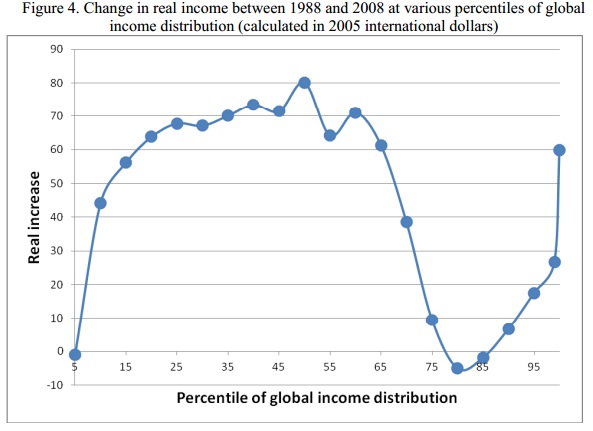Welcome to DU!
The truly grassroots left-of-center political community where regular people, not algorithms, drive the discussions and set the standards.
Join the community:
Create a free account
Support DU (and get rid of ads!):
Become a Star Member
Latest Breaking News
General Discussion
The DU Lounge
All Forums
Issue Forums
Culture Forums
Alliance Forums
Region Forums
Support Forums
Help & Search
General Discussion
In reply to the discussion: "Income Inequality Is Not Rising Globally. It's Falling." [View all]pampango
(24,692 posts)15. Good news to liberals that global inequality is falling. Bad news that domestic inequality is rising
The top 1% has seen its real income rise by more than 60% over those two decades. The largest increases however were registered around the median: 80% real increase at the median itself and some 70% around it. It is there, between the 50th and 60th percentile of the global income distribution that we find some 200 million Chinese, 90 million Indians, and about 30 million people each from Indonesia, Brazil and Egypt. These two groups—the global top 1% and the workers of the emerging market economies— are indeed the main winners of globalization...
But the biggest loser (other than the very poorest 5%), or at least the “non-winner,” of globalization were those between the 75th and 90th percentile of the global income distribution whose real income gains were essentially nil. These people, who may be called a global upper-middle class, include many from former Communist countries and Latin America, as well as those citizens of rich countries whose incomes stagnated.
More than fifty percent of one’s income depends on the average income of the country where a person lives or was born (the two things being, for 97% of world population, the same). This gives the importance of the location element today. There are of course other factors that matter for one’s income, from gender and parental education which are, from an individual point of view externally given circumstances, to factors like own education, effort and luck that are not. They all influence our income level. But the remarkable thing is that a very large chunk of our income will be determined by only one variable, citizenship, that we, generally, acquire at birth. It is almost the same as saying, that if I know nothing about any given individual in the world, I can, with a reasonably good confidence, predict her income just from the knowledge of her citizenship... Around 1870, class explained more than 2/3 of global inequality. And now? The proportions have exactly flipped: more than 2/3 of total inequality is due to location.
OECD study: Income gains to top 1% last 30 years - US worst (by far), Europe best (by far).
Canada is second only to the U.S. in its growing inequality. In the U.S., about 47 per cent of total growth went to the wealthiest one per cent between 1975 and 2007, compared to 37 per cent in Canada, while in Australia and the U.K., about 20 per cent of growth went to the wealthiest.
In Nordic countries and in France, Italy, Portugal and Spain, about 90 per cent of growth went to the 99 per cent of middle and low-income earners in the same period.
Larry Summers, who was secretary of the treasury under Bill Clinton and is now a Harvard professor, has pointed out how the constant push for tax cuts and the erosion of union bargaining rights has led to greater income inequality.
The study calls for higher marginal tax rates and fewer tax deductions and credits aimed at high income earners. It also advocates wealth or inheritance taxes.
http://www.cbc.ca/news/business/top-1-taking-lion-s-share-of-global-growth-oecd-says-1.2627154
Canada is second only to the U.S. in its growing inequality. In the U.S., about 47 per cent of total growth went to the wealthiest one per cent between 1975 and 2007, compared to 37 per cent in Canada, while in Australia and the U.K., about 20 per cent of growth went to the wealthiest.
In Nordic countries and in France, Italy, Portugal and Spain, about 90 per cent of growth went to the 99 per cent of middle and low-income earners in the same period.
Larry Summers, who was secretary of the treasury under Bill Clinton and is now a Harvard professor, has pointed out how the constant push for tax cuts and the erosion of union bargaining rights has led to greater income inequality.
The study calls for higher marginal tax rates and fewer tax deductions and credits aimed at high income earners. It also advocates wealth or inheritance taxes.
http://www.cbc.ca/news/business/top-1-taking-lion-s-share-of-global-growth-oecd-says-1.2627154
Nordic countries support (and the rest of European countries for that matter) support trade with the global poor with tariff-free trade with the poorest countries. They both support global equality and domestic equality at the same time.
Edit history
Please sign in to view edit histories.
16 replies
 = new reply since forum marked as read
Highlight:
NoneDon't highlight anything
5 newestHighlight 5 most recent replies
RecommendedHighlight replies with 5 or more recommendations
= new reply since forum marked as read
Highlight:
NoneDon't highlight anything
5 newestHighlight 5 most recent replies
RecommendedHighlight replies with 5 or more recommendations
There is no reason why wealth cannot be better distributed within US economy. Canada does it.
applegrove
Jul 2014
#1
And this op-ed is an attempt to help steer public discussion AWAY from that point.
closeupready
Jul 2014
#5
Which is a huge and meaningfull change. Must more of a change than someone in the West
applegrove
Jul 2014
#3
Agreed. Instead of fighting world trade we should be fighting the right wing's
applegrove
Jul 2014
#8
We can fight unfair trade practices and agreements that harm US interests, AND
closeupready
Jul 2014
#11
And citizens in places like the US are going from moderately wealthy to moderately poor.
Erich Bloodaxe BSN
Jul 2014
#6

